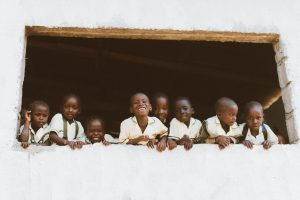TechInAfrica – The new open-source technology ‘Tress of Knowledge’ was born from William Sachiti’s concern, a Zimbabwean AI expert and CEO of UK-based startup Academy of Robotics for the education in Africa. According to UNESCO’s latest children in sub-Saharan Africa as the children of primary school age have doubled since 1990 and 1 in 5 children of primary school age are out of school.
Sachiti sees the potential of smartphones to improve the access to education, as more than 23% of people in Sub Saharan Africa have access to smartphones and the number is expected to reach 39% five years from now.
The technology allows connection from a rural landmark to wifi in providing the pre-loaded educational content. A micro-computer is embedded into the landmark to reduce the chance of damage and requires little to no maintenance for years.
Sachiti says anyone within a roughly 100m radius can then access the content on any mobile device free of charge. Users with any of the following wifi-enabled devices, such as phone, tablet, laptop or computer can access the content without the need of a network provider, eliminating the costly data charges. It also comes with a solar-powered battery charging station that users can use to charge their phone.
“One of the challenges in providing education through smartphones is that, while many people have access to a basic smartphone of some description, in many areas 3G coverage is still patchy. The data costs are high for most people and in rural areas keeping the phones charged is a problem when there is limited or no electricity. Trees of Knowledge aims to address all these challenges,” says Sachiti. “There is an urgent need to improve access to education for these children”.

“While many programs already exist to fix this problem, it is still not enough,” says Sachiti. “With the growth of the developer community in Africa, I believe we have the opportunity to simply release the technology and let local communities build it themselves. If this technology reaches one or two more children, then I feel it would be a success.”
Source: Itnewsafrica.com


